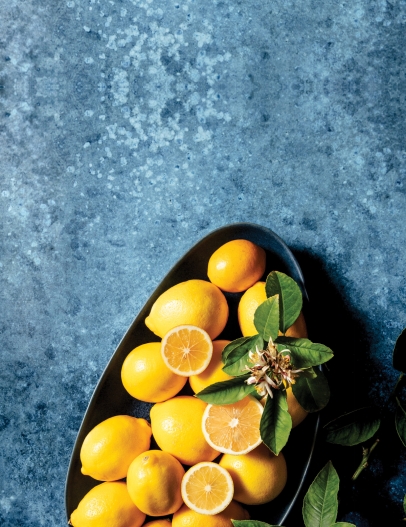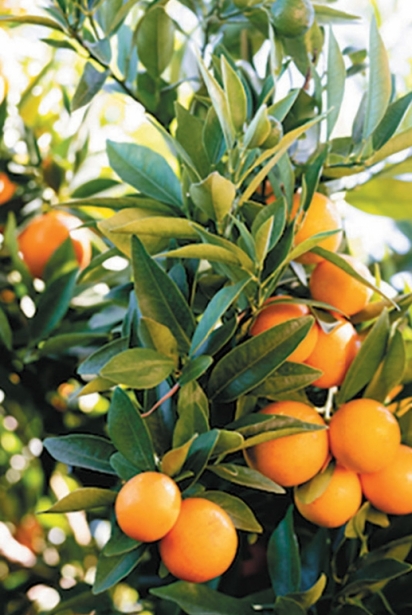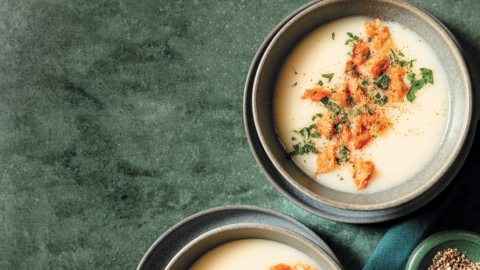In Season Lemons
Lemons are a favorite winter fruit, and although California’s big production regions are in the Central Valley and the coastal regions north of Los Angeles, lemons are also produced in Napa and Sonoma, though on a much smaller scale. There are numerous varieties of lemons, but the most popular are Meyer, Lisbon and Eureka. More exotic types, like the variegated Pink Eureka, Bearss and the huge Ponderosa, are more likely to appear in farmers markets from growers in regions farther south or in backyards. Although all lemons can be used culinarily in the same ways, the thin, almost sweet skin of the Meyer lemon makes it especially tasty to caramelize through roasting or grilling.
MEYER LEMON
Made famous by Alice Waters of Chez Panisse back in the 1980s, the Meyer lemon has a sweet-tart, nuanced flavor prized by chefs and cooks. Because of its natural sweetness, less sugar is needed in recipes that use Meyers. Introduced into California by its namesake, Frank N. Meyer, a plant explorer employed by the USDA who brought it back from China in 1908, it’s thought to be a naturally occurring hybrid, a cross between a Eureka lemon and a Mandarin orange. As it matures, the Meyer’s skin color changes from a light greenish yellow to deep gold, and the fruit increases in size from smallish to avocado size. Its season begins around November and lasts through March, sometimes into April. They are typically found at specialty markets and farmers markets.
Flavor: Tart-sweet, getting sweeter with maturity. Low acid, thin skin, medium seedy
Appearance: Light yellow to golden orange, very smooth and thin skin, size increasing with maturity. Almost round when young, becomes oblong with maturity.
Best uses: Cakes, cookies, pies, desserts; salad dressings, braising, roasting, grilling, sauces, breads
LISBON LEMON
The Lisbon lemon has a tart, mouth-puckering taste that is the very definition of lemon flavor. It is almost interchangeable with the Eureka in flavor and appearance, being true lemon yellow with slightly pointed tip. Lisbon and Eureka are the most common lemons in supermarkets and are typically available year-round. The Lisbon was introduced to California in 1950 from Portugal and it is now the primary variety grown in Ventura County and Southern California. This and the Eureka are the ones to use for sharp, intense lemon flavor
Flavor: Tart, sharp, high acid
Appearance: Bright yellow, slightly rough skin, medium size, medium seedy
Best uses: Cakes, cookies, pies, desserts; salad dressings, sauces, beverages
EUREKA & PINK EUREKA
Like the Lisbon, the Eureka has the quintessential acidity and sharp tang of true lemon flavor. Unlike either the Meyer or the Lisbon, however, the Eureka’s bright yellow skin has a thick, pithy layer beneath it. The Eureka was introduced to California in 1858, when seeds of an Italian lemon variety were planted in Los Angeles, the home of the California citrus industry. The Eureka, which bears fruit year-round, does best in warm climates and is sensitive to cold temperatures. The Pink Eureka, or Variegated Lemon, aka lemonade lemon, is a sport or natural mutation of a Eureka discovered in 1930. The skin is variegated green and yellow striped; the inside pinkish. Although it has classic, mouth-puckering tartness, it sweetens somewhat with maturity. It’s much appreciated by home gardeners and landscapers for its white and green foliage.
Flavor: Sharp, tart, high acid
Appearance: Bright yellow, round with a pointed tip, slightly rough skin, medium size, few seeds. Pink has variegated yellow and green skin, pink interior.
Best uses: Cakes, cookies, pies, desserts; salad dressings, sauces, beverages
Georgeanne Brennan is the author of more than 30 cookbooks, the recipient of a James Beard Award and Julia Child Award, and a partner in L’Apero de Trois aperitif tasting room. georgeannebrennan.com







